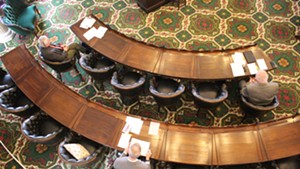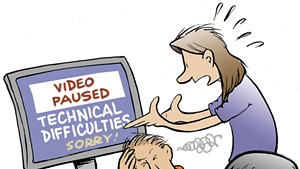
- Screenshot
- Members of the Vermont Senate meet online Tuesday
Twenty minutes after members of the Vermont Senate were scheduled to begin
an online meeting Tuesday morning, they were finally visible to those watching from home.
"You are live," Senate operations manager Vanessa Davison informed the lawmakers as they appeared onscreen.
"OK, Vanessa has spoken," said Senate President Pro Tempore Tim Ashe (D/P-Chittenden). "Good morning, everybody."
It sounded like the start of the meeting, but it wasn't. According to several senators in attendance, they had already spent several minutes discussing the state's beleaguered unemployment insurance program — in private.
Though they are supposed to conduct the people's business in public, Vermont legislators have a history of doing so behind closed doors. They have met
in the basement of the Department of Taxes,
in the Senate president's office and
in the lieutenant governor's office.
The legislature's move to remote meetings in the age of the coronavirus has increased transparency in some respects. For the first time, members of the public can now view meetings of the House, Senate and various committees in real time — and play back the sessions later with a quick trip to YouTube.
But lawmakers have also found new ways to gather out of sight.
As Seven Days reported earlier this month, House Democrats have held invitation-only campaign strategy sessions on the online Zoom platform, drawing criticism from one lawmaker who feared they could veer into policy discussion.
By all accounts, Tuesday's Senate pre-meeting was a short-lived affair. Members discussed the Department of Labor's failure to promptly process unemployment claims — and a plan to let House members help clear the backlog. Ashe expressed reservations about the idea, according to those present, citing concerns about the separation of powers between the legislative and executive branches.
Still, even some leaders of the Senate expressed discomfort with the private portion of the meeting.
"I don't think it looks good," Senate Majority Leader Becca Balint (D-Windham) said. "I believe that all these discussions should be happening with the feed going live." She argued that as soon as a quorum of the body was present, the public should be granted access.
Senate Minority Leader Joe Benning (R-Caledonia) said the pre-meetings usually consist of "jibber-jabbering about who's got snow." But he said Tuesday's session went on too long. "It was certainly uncomfortable," he said.
Whether it's illegal is another question. Though the Vermont Constitution declares that the doors of the Statehouse "shall be open," legislators and their lawyers have long argued that the state's open meeting law does not apply to them. And while at least 27 of the Senate's 30 members were present for Tuesday's gathering — well more than a quorum of 16 — it was technically an "all-Senate caucus," not a formal session.
"My recommendation usually for meetings within the [Statehouse] is that if you're doing a caucus you should probably have it open to the press," said Senate Secretary John Bloomer, who serves as the chamber's parliamentarian. "Do you have to by the Constitution? I'm not sure, but it's just easier."
Bloomer said it would be more problematic if a quorum of the Senate were debating legislation in private. Still, he said, "The optics are not good."
Ashe, who facilitated Tuesday's meeting, said it "wasn't meant to be secretive." He said that senators typically have a brief chat about logistics before opening the livestream to the public, but he conceded that he had erred.
"Today I was too slow to switch it over to live, and in that sense it was a mistake, though we weren't deliberately trying to mask something from the public," he said. "I should have switched over earlier."
Sen. Randy Brock (R-Franklin) complained during the public portion of Tuesday's meeting that many Senate gatherings were getting started late, which he argued inconvenienced those watching from home. "I think it would be very helpful if we tried to do things on time," he told his colleagues.
In an interview, Brock said he felt strongly that the public should be included, but he added that it was only natural for senators to converse with one another as they waited for others to sign on.
"On the one hand, you shouldn't be discussing business you're going to vote on or you're going to discuss on the floor," he said. "But on the other hand, I would hate to create an artificial barrier that eliminates collegiality, because I think that's an important part of the Senate tradition, as well."
Disclosure: Tim Ashe is the domestic partner of Seven Days
publisher and coeditor Paula Routly. Find our conflict-of-interest policy here: sevendaysvt.com/disclosure.















Comments
Comments are closed.
From 2014-2020, Seven Days allowed readers to comment on all stories posted on our website. While we've appreciated the suggestions and insights, right now Seven Days is prioritizing our core mission — producing high-quality, responsible local journalism — over moderating online debates between readers.
To criticize, correct or praise our reporting, please send us a letter to the editor or send us a tip. We’ll check it out and report the results.
Online comments may return when we have better tech tools for managing them. Thanks for reading.